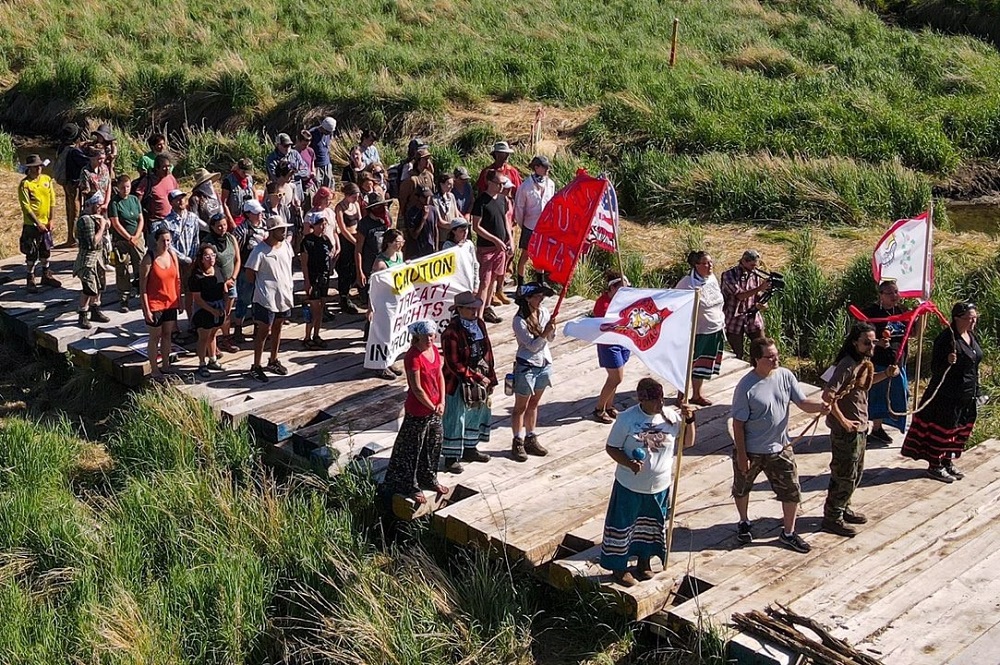Social justice work isn’t a specialty ministry or a spiritual add-on. It is core to our United Methodist values. Our mission statement challenges us to be disciples of Jesus Christ who are working to transform the world.
United Methodists engaged in ministries of correcting broken systems of oppression and inequality say the work is an inevitable expression of their faith as they dig deep into the more familiar disciplines of worship, prayer and meeting in small groups.
In pursuing Christ for personal change, they find themselves propelled toward working for change in the world around them.
The General Rule of Discipleship recorded in The United Methodist Book of Discipline teaches us to engage in both private and public expressions of faith.
“Our inward transformation, our spiritual practices are shaping our lives,” says the Rev. Dana Neuhauser, racial justice organizer for the Minnesota Conference of the United Methodist Church. “How our worship practices are shaping our lives flows into, informs and sometimes really activates our desire to join God in creating transformation in the world.”
Neuhauser is the Racial Justice Organizer for the Minnesota Annual Conference, as well as a member and Minister of Public Witness at New City Church, a United Methodist congregation in Minneapolis that found itself in the trauma epicenter of the city and world in the summer of 2020 following the murder of George Floyd.
Spiritual muscle required
If not for the intentional time spent worshipping, praying and meeting together in small groups since the church’s founding in 2017, New City’s members would not have been prepared to step into the world’s suffering in a strong and present way.
“We had built some spiritual muscle of connection to God and connection to one another so that even in this trauma-inducing experience, we knew that we had one another,” Neuhauser explains. “So I think the way we have approached spiritual worship and connection and connected explicitly to the work of transforming the world helps prepare us for the emergency moments.”
1. Let’s worship together
The Rev. Tyler Sit, senior pastor at New City, recently published “Staying Awake: The Gospel for Changemakers,” a book that outlines spiritual practices for living a life of inner and external reform. Worship tops the list.
Worship services are intentional about connecting the Gospel of Jesus Christ to what’s going on in the world,” Neuhauser says, adding that New City’s sermons are Biblically-based with “an intentional posture of listening for needs in the community.”
Joe Meinholz has been a member at New City for a couple of years. He currently works for an interfaith organization as a community organizer in the climate change movement, specifically pipeline resistance.
When he worships with his New City church family, “it takes hope to a different level,” he shares. “We are together believing that transformation is possible.”
2. Pray, pray, pray
Alongside worship, prayer is fundamental.
Spiritual practices are, “broadly, the daily habits we pick up to do soul wrestling,” Sit writes in his book. And prayer is “a particular type of spiritual practice that focuses on connecting with God…daily visits with God to build up a relationship and realign yourself with God’s deep desires for world.”
When we have the strong connection to God through prayer, says Marlena Graves, United Methodist author and speaker, we will be more Christ-like and have a heart that reflects God’s love, all which “will be manifest in the way we treat other people.
“We ultimately have to be the answer to our prayers,” Graves explains, referencing 1 John 3:17-18, which says (paraphrased), if we see someone in need, but don’t help them, then we’ve missed an opportunity to show God’s love.
3. The Wesleyan way: Small groups
Holding one another accountable is a key part of the New City congregation. The small groups, called Life Together groups, offer loving, supportive accountability.
“Christian community is community for a reason,” Neuhauser says. “We do church with one another because journeying through life is not an independent project,” Neuhauser says.
“As progressive as we are at New City, we’re super Wesleyan at the core,” Neuhauser explains, pointing to John Wesley’s focus on small groups.
“We tell our personal story in community and cultivate a practice of listening,” she says, adding that small group members may ask one another how they can be supportive, what is needed for follow through in a specific area or what is holding you back.
“It isn’t a replacement for any kind of therapeutic work you want to do, but it is a covenant partnership that helps us journey together,” Neuhauser explains.
As United Methodists look more closely at engaging in social justice work in their communities, Meinholz emphasizes that the desire to feel closer to God is interrelated to helping marginalized persons in the neighborhood or caring about climate change.

“Healing a broken world heals us,” Meinholz observes. “Jesus said to go and do greater things. To do that, I need to pray every day. I need to sing some worship songs every day. I need to keep remembering the Gospel that saves me so I can face a really messed up world with Resurrection.
“At New City, we talk about inward and outward transformation,” Meinholz says. “They weave into each other and you can’t have one without the other. It’s all one thing.”
Crystal Caviness works for UMC.org at United Methodist Communications. Contact her by email or at 615-742-5138.
This content was published July 14, 2021.




